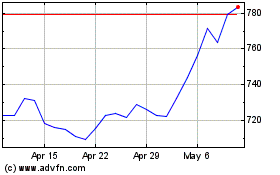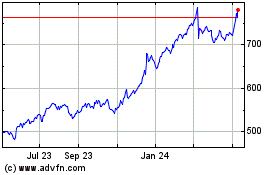Today's Top Supply Chain and Logistics News From WSJ
April 06 2017 - 7:11AM
Dow Jones News
By Paul Page
Sign up:With one click, get this newsletter delivered to your
inbox.
Costco Wholesale Corp. admits to being slow to embrace online
sales, but anyone who has shipped a one-gallon jug of mayonnaise
can understand why. The wholesaling giant is taking a contrarian
stance on e-commerce, the WSJ's Sarah Nassauer and Laura Stevens
report, even as competitive threats push the company to respond
more aggressively to the changes coursing through retail markets.
Costco's measured stance is backed by strong store sales that come
even as many brick-and-mortar chains falter, and by the tough
financial equation that online sales bring to its business.
Shipping the hefty-size goods that consumers buy from Costco in
bulk could eat into profit margins that are already low for most
household staples -- particularly as carriers move to charge by
dimension as well as weight. Costco is adding products to its
website and investing in distribution centers to speed deliveries,
but its online sales growth is slowing and that may leave Costco
wondering whether it's moving fast enough.
The West Coast ports labor slowdown is still echoing across the
retail world, at least according to one struggling importer.
Payless ShoeSource Inc. says the labor woes two years ago helped
push the company into chapter 11 bankruptcy protection this week,
the WSJ's Jacquiline Palank reports. In a filing that details steep
losses and plans to close some 400 stores, the largest footwear
chain in the U.S. says its troubles in a changing retail market
worsened in 2015. It says the labor dispute that backed up cargo
flows kept the company from stocking its shelves during the crucial
Easter selling season. By the time delayed inventory arrived,
Payless had to sell the shoes at a deep discount "in order to
realign inventory and product mix." That left the company without
the cash it needed to respond to the growing dominance of
e-commerce in consumer markets, a competitive force that is still
weighing on the company as it prepares to shutter outlets.
When commodities-trading house Mercuria Investment Co., ING and
Société Générale SA in February executed the first delivery of
crude oil to run entirely on a blockchain platform, they cut the
costs and time needed for the transaction significantly. The banks
are now talking about a similar trade in liquefied natural gas, the
WSJ's Stephanie Yang reports, part of a growing effort to test
whether the technology can solve longstanding problems in the
trading of physical commodities. Traders in goods, including a
cotton consortium that includes Cargill Inc. and Louis Dreyfus Co.,
are evaluating how the technology, which records each transaction
in an electronic ledger that provides an identical copy to every
computer, tracks goods and financial actions through the supply
chain. Mallory Alexander International Logistics Chief Executive
Neely Mallory remains skeptical after two shipping trials this
year, however, saying many U.S. export markets aren't ready to
embrace the technology.
E-COMMERCE
Amazon.com Inc. is getting even deeper into warehouse
technology. The e-commerce giant is taking a big stake in fuel-cell
maker Plug Power Inc. that could make it one of the largest
shareholders in a company that helps power material-handling
equipment, the WSJ's Imani Moise and Laura Stevens report. Plug
Power is a relatively small operation, generating $85.9 million in
revenue last year and no annual profits in its 20 years of
existence, but its place in warehouses highlights the relentless
push Amazon is undertaking to control its supply-chain operations
-- and to make its distribution centers more efficient. The tie-up
recalls Amazon's $775 million acquisition in 2012 of Kiva Systems
Inc., bringing into the company a central player in robotics for
warehouse operations. It also puts Amazon in an interesting
competitive position. Plug Power's biggest customer last year was
Amazon's top rival in the retail business, Wal-Mart Stores Inc.
QUOTABLE
IN OTHER NEWS
General Electric Co. is weighing the sale of its
consumer-lighting business, solidifying the industrial giant's move
away from consumer businesses. (WSJ)
Private-sector payrolls rose by 263,000 last month. (WSJ)
European investment fund JAB Holding Co., will pay roughly $7.16
billion to acquire food chain Panera Bread Co. (WSJ)
European regulators added their conditional approval to the U.S.
nod to China National Chemical Corp.'s takeover of Swiss seed and
pesticide maker Syngenta AG. (WSJ)
Gillette is slashing prices for its razors under heavy
competition from online retailers. (WSJ)
Government inspections of railroads that haul crude oil found
almost 24,000 safety defects, including problems like those blamed
in recent derailments. (Associated Press)
China became the biggest buyer of U.S. crude oil in February,
surpassing Canada. (Bloomberg)
California's merchandise exports expanded 11% in February.
(Sacramento Bee)
Authorities in Aurora, Colo., outside Denver, approved $1.18
million in incentives for an Amazon distribution center. (Denver
Post)
India will allow imports of 500,000 metric tons of duty-free raw
sugar, as a drought cuts output below consumption levels.
(Reuters)
Malaysia is emphasizing e-commerce in its efforts to build up
exports of halal products. (Nikkei Asian Review)
Insurers in London issued a guide to potential liquefaction of
bulk cargo following the apparent sinking of the ore carrier
Stellar Daisy. (Maritime Executive)
German shipping investment house Marenave Schiffahrts will sell
its fleet under a liquidation agreement with banks that finance the
single-ship companies that legally own the vessels. (Lloyd's
List)
Wallenius Wilhelmsen Logistics ASA began trading on the Oslo
stock exchange. (Automotive Logistics)
German logistics company Rhenus Group acquired British last-mile
operator Network 4 Home Deliver. (Forwarder Magazine)
An enormous tunnel-boring machine called Bertha finished nearly
four years of drilling in Seattle to create an underground highway.
(Seattle Times)
ABOUT US
Paul Page is deputy editor of WSJ Logistics Report. Follow him
at @PaulPage, and follow the entire WSJ Logistics Report team:
@brianjbaskin, @jensmithWSJ and @EEPhillips_WSJ and follow the WSJ
Logistics Report on Twitter at @WSJLogistics.
Subscribe to this email newsletter by clicking here:
http://on.wsj.com/Logisticsnewsletter .
Write to Paul Page at paul.page@wsj.com
(END) Dow Jones Newswires
April 06, 2017 06:56 ET (10:56 GMT)
Copyright (c) 2017 Dow Jones & Company, Inc.
Costco Wholesale (NASDAQ:COST)
Historical Stock Chart
From Mar 2024 to Apr 2024

Costco Wholesale (NASDAQ:COST)
Historical Stock Chart
From Apr 2023 to Apr 2024
